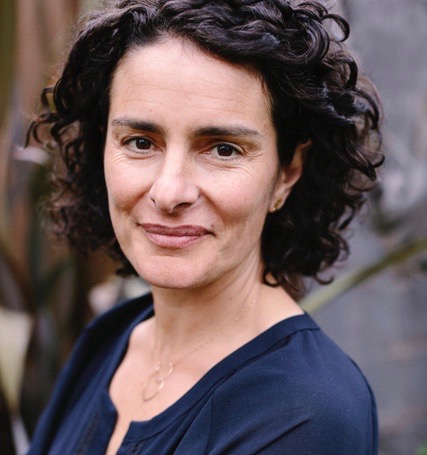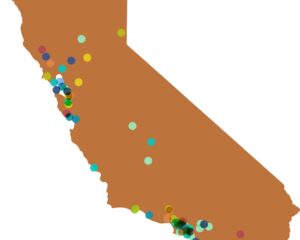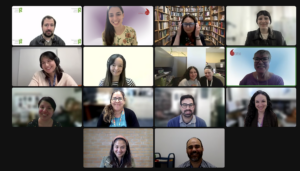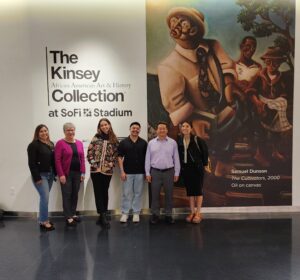Oakland, California and Saint-Denis, France are two urban areas 5,550 miles apart, but close in spirit. One is the birthplace of the Black Panther Party, the other the final resting place for all but three French kings from the 10th century to 1789. Similarities between the two cities abound: they exist separated from more iconic cities by a bridge across the San Francisco Bay, and by a major freeway (the Boulevard Périphérique) around Paris, and both face issues of gentrification, rapid growth, and displacement.
They also have deeply rooted artistic communities that can play an increasingly critical and catalyzing role in creating more inclusive and equitable cities, which led to OAKLAND/SAINT-DENIS, a cooperation project of the Cultural Services of the French Embassy in the United States, in co-production with the French American Cultural Society, the Institut Français, and California Humanities.
We have been proud to be part of this partnership, which has brought together cultural and urban leaders in both cities to compare innovations, promote international and interdisciplinary dialogue, and amplify the role of the cultural sector in urban development. We provided support for Camille Servan-Schreiber’s short documentary film about the exchange.
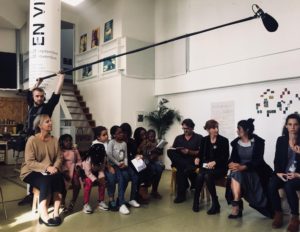
Servan-Schreiber, who has been a producer on past California Humanities-supported projects, is part of the creative partnership at Bread&Butter Films in Berkeley. We spoke with her about her experience in making this film.
What was it about the Oakland/Saint Denis cooperation project that interested you originally?
I grew up in Paris but have now lived in the East Bay for 20 years. As a filmmaker I have always been interested in the role of culture in our societies and how artists and their work contribute to shape how communities view themselves. Working on this film gave me an opportunity to reflect more deeply on the similarities and differences between two places I know and love. I learned a lot about Saint-Denis. I was also intrigued by the fact that the members of each delegation had very diverse backgrounds and areas of expertise which was going to make the exchange very rich.
Did your interest in the project change over time, as you got more involved and learned more?
Both places share a number of similar challenges, but they also draw on very different histories and governing systems. Learning how the systems work in greater detail, how it affects the artists and the communities was fascinating. Gentrification is a theme we have been talking about for a very long time in California and in Saint-Denis things are starting to bubble up. It’s a very different landscape with lots of possibilities ahead. I was struck by how tightly knit a community it is. They were incredibly welcoming.
It was also a great pleasure to meet many artists and community members who shared their passion for their work and the place where they do it. Their stories and solutions they are experimenting with are a reflection of the environment in which they live, but talking to people from another country gave them new perspectives and new ideas.
What were the logistical challenges of filming in two countries and two languages?
Making a film is always about finding the right team. Being bilingual and having a foot in both places made it easy. I wanted to work with local crews in both cities so that they would feel connected to the people we were filming. I found an amazing French crew in France who spoke great English, so it was easy for them to follow the action. And in the United States most of the conversations ended up being in English so it made things easier. In the end we had to translate all the interviews so that the film could be watched and understood by everyone. That was a time-consuming and meticulous process.
How did you approach the editing process, with a lot of footage and less than 15 minutes of edited documentary length to work with?
We filmed a lot because there were many encounters, many workshops, many conversations, all more fascinating than the next. But in the end, it had to be boiled down to the essence of the big ideas people were exchanging. We also wanted people to get a feel for both places if they had never been there.
Tell us more about the artistic choices you made, like the soundtrack.
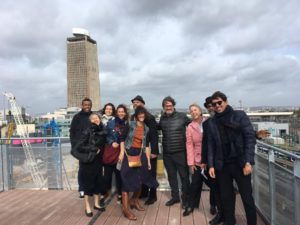
I have to confess I love the soundtrack of the film. It was composed by an incredibly talented young man who is a graduate of Youth Media, a program in Oakland that was visited by the French delegation. His name is Oluwa Femi; it was his first time working on a film like this and he rocked it. I wanted the music to reflect the diversity of both cities, and in particular the deep African roots of the Saint-Denis community.
What do you want people to take away from this film?
Our hope with the documentary film is that it will show and give a feel for the communities we portray while helping to tell stories and share ideas across two very different cultures on opposites sides of an ocean. The hope is that it can spark conversations in other artistic communities to reflect upon the challenges they face and encourage them to take agency to look for solutions that they may not have considered before. What struck me with this project is that everyone who participated walked away inspired and energized by all that they learned from people in the other community.
Next steps in the coming months as part of the OAKLAND/SAINT-DENIS cooperation project are a bilingual publication; conferences and community conversations with artists, developers, and urban planners; and artistic productions in both cities.

